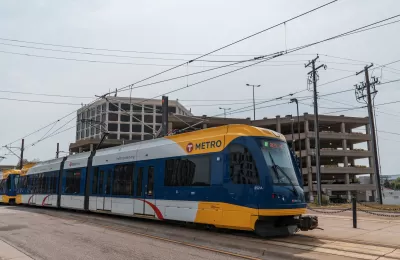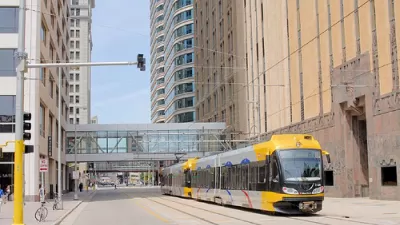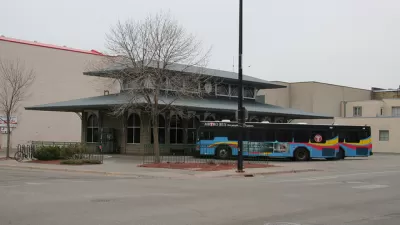In 2017, Metro Transit in the Twin Cities raised fares but also started a program for low-income riders to help ease the burden of travel costs.

The Transit Assistance Program started in the Twin Cities about two years ago at the same time that fares were raised by 25 cents. The TAP program lets low-income riders use the bus and rail system for $1 per trip with unlimited transfers for up to 2 1/2 hours.
"[It] replaced a bonus program that offered 10 percent discounts to any customer who bought rides in bulk using a stored-value card. In other words, rides got cheaper for low-income riders, but discounts for general customers went away," reports Frederick Melo.
Melo says that about 20,000 people are enrolled in the program and TAP participants have made 1.7 million trips, but more people are eligible to take advantage of the discounted fare. The program’s coordinator notes that the lower fare gives riders more travel flexibility by allowing them to make more trips.
Metro is partnering with 65 community organizations distributing the cards to clients. "The TAP program, which carries a $3 million cost over the two-year stretch, is paid for in large part by discontinuing the stored-value bonus for Go-To cards," notes Melo.
FULL STORY: Metro Transit’s Transit Assistance Program celebrates two years, nearly 2 million rides

Alabama: Trump Terminates Settlements for Black Communities Harmed By Raw Sewage
Trump deemed the landmark civil rights agreement “illegal DEI and environmental justice policy.”

Planetizen Federal Action Tracker
A weekly monitor of how Trump’s orders and actions are impacting planners and planning in America.

The 120 Year Old Tiny Home Villages That Sheltered San Francisco’s Earthquake Refugees
More than a century ago, San Francisco mobilized to house thousands of residents displaced by the 1906 earthquake. Could their strategy offer a model for the present?

In Both Crashes and Crime, Public Transportation is Far Safer than Driving
Contrary to popular assumptions, public transportation has far lower crash and crime rates than automobile travel. For safer communities, improve and encourage transit travel.

Report: Zoning Reforms Should Complement Nashville’s Ambitious Transit Plan
Without reform, restrictive zoning codes will limit the impact of the city’s planned transit expansion and could exclude some of the residents who depend on transit the most.

Judge Orders Release of Frozen IRA, IIJA Funding
The decision is a victory for environmental groups who charged that freezing funds for critical infrastructure and disaster response programs caused “real and irreparable harm” to communities.
Urban Design for Planners 1: Software Tools
This six-course series explores essential urban design concepts using open source software and equips planners with the tools they need to participate fully in the urban design process.
Planning for Universal Design
Learn the tools for implementing Universal Design in planning regulations.
Clanton & Associates, Inc.
Jessamine County Fiscal Court
Institute for Housing and Urban Development Studies (IHS)
City of Grandview
Harvard GSD Executive Education
Toledo-Lucas County Plan Commissions
Salt Lake City
NYU Wagner Graduate School of Public Service





























